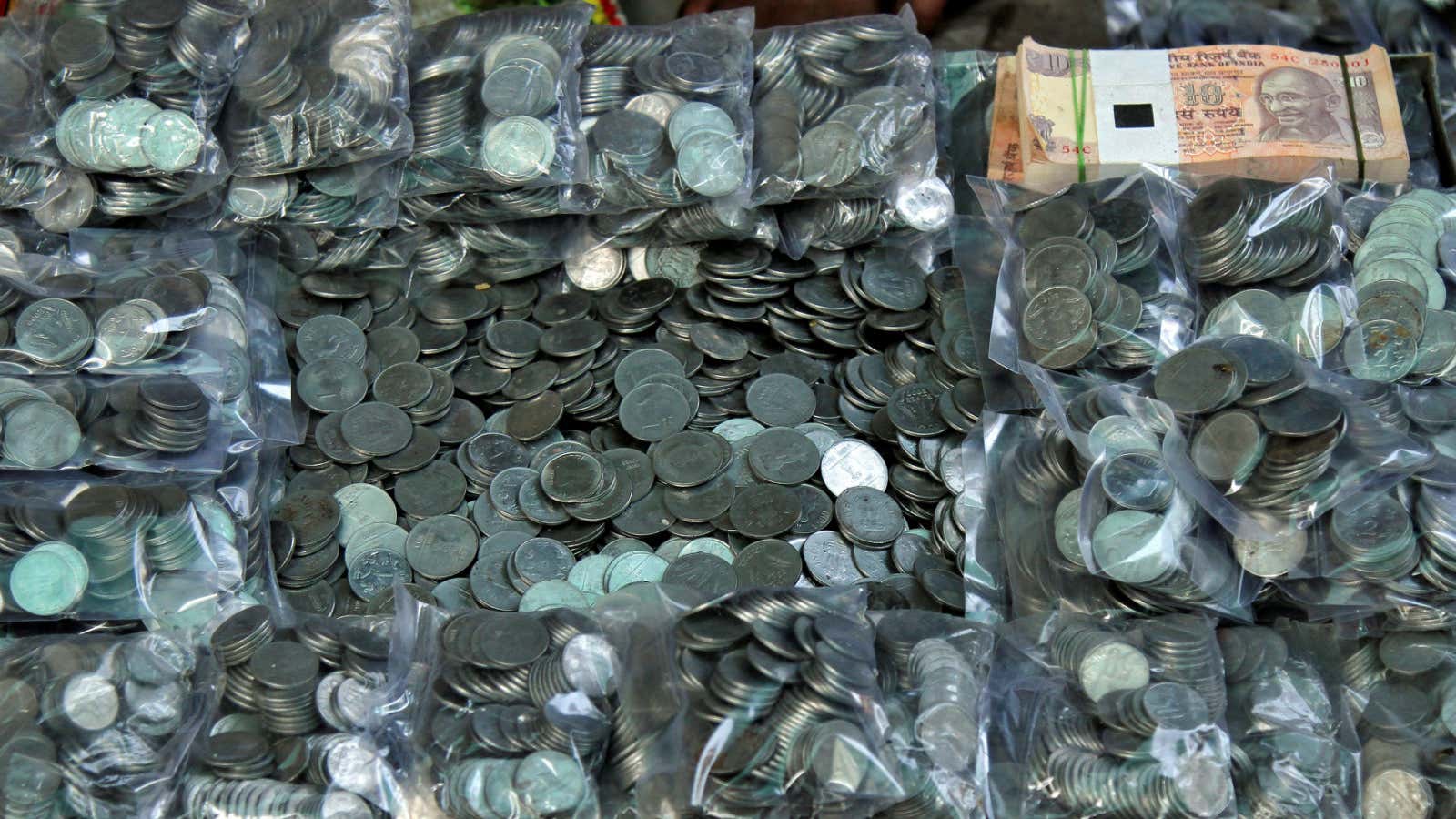On Sept. 15, business news channel CNBC-TV18 flashed that India’s commerce ministry would propose a devaluation of the rupee.
The report resulted in some panicky headlines and heated discussions on the merits of such a move. While the government later in the day denied any such plan, the rupee lost 0.28% in value compared to the US dollar.
According to media reports, the discussions to devalue the currency were sparked by exporters in India who believed they could benefit from a weaker rupee.
“A rupee devaluation is required,” Ajai Sahai, director-general of the Federation of Indian Export Organisations, told Reuters. ”Indian exporters are outpriced in the global market.”
But is it possible for the Indian government to devalue the currency? Is it a good move for the economy? If not for a devaluation, how can Asia’s third-largest economy improve its dismal export tally? Quartz talked to some of the leading economists around the world to answer these questions.
The market-linked currency
Unlike China, where the daily exchange rate of the yuan is fixed by the central bank, the government in India does not control the exchange rate of the Indian currency. Since 1993, the rupee’s exchange rate has been determined by the market, which means it depends on demand and supply forces.
“As neither the government nor the Reserve Bank of India (RBI) sets the exchange rate, the question of devaluing it does not arise,” said Arvind Virmani, an economist and former chief economic advisor.
The Indian central bank only steps in to “dampen excessive volatility in the exchange rate” at times, Virmani added. So if the value of the rupee is rapidly falling against the dollar, the RBI will sell dollars in the open market to save the domestic currency, and vice-versa.
Is devaluation a good idea?
Many economists, including central bankers, say that India should not tinker with its current mechanism and devalue the rupee. Not only will it have a devastating impact on the domestic economy, it will also not help exports in the long run.
“Today’s rupee value is pretty reasonable. Devaluation will not necessarily help exports. India needs macro-stability, years of sustained growth,” former RBI governor Raghuram Rajan said in July.
“Even if it proves to be good for exports, there are other consequences, like the prices of imported products would rise, in turn pushing up inflation. Britain is the best example currently. As the GBP (British pound) fell post Brexit, the inflation in Britain is now expected to shoot up” explained Saugata Bhattacharya, chief economist at Axis Bank.
High prices of imported commodities won’t bode well for India, which is heavily dependent on imports of oil, defence equipment and machinery. An increase in oil prices pushes up inflation. This again will push up the cost for exporters, and won’t solve their problem of price-competitiveness.
The central government does not have much of an incentive to devalue the rupee right now because not only will it lead to high inflation—which has often toppled governments in India—but also slower growth.
“(A rupee) devaluation would run counter to the government’s desire to maintain stability and predictability, and could hamper improvements in foreign investor sentiment towards India following recent positive reforms including the passage of the GST bill,” Nomura economists Sonal Varma and Neha Saraf wrote in a note on Sept. 15. “Furthermore, corporate balance sheets could come under further pressure if there is a sharp revaluation of foreign liabilities,” they added.
Meanwhile, India is expected to report a current account surplus for the April-June 2016 period, a first in nine years, according to a Reuters poll. A current account surplus typically means the country’s imports and the value of investments made are lower than the value of exports, interest and dividend receipts.
“With a current account surplus expected in the last quarter, boosting exports is not critical for the macro economy right now,” Virmani said.
What should exporters do?
The government should strategise to increase India’s export competitiveness, instead of adopting a “short-sighted approach” like devaluation, said Rajiv Biswas, Asia-Pacific chief economist at IHS Markit, a data and analytics firm.
“To sustainably improve Indian export competitiveness, the Indian government should work with the industry to boost productivity and strengthen innovation. The government should focus on its ‘Make in India’ strategy to make India a global hub for manufacturing exports,” Biswas explained.
Indeed, most economists we spoke to reiterated that India must invest more in infrastructure in order to become an export hub.
There should be “more investment and (development of) transport infrastructure,” Meghnad Desai, an India-born economist and a UK Labour politician, said in an email. Reducing delays due to paperwork will also cut costs and a constant search for new markets will help exporters battle the slowdown, he added.
India’s directorate general of foreign trade has also emphasised that exporters must hunt for new markets in Latin America, Africa and the Commonwealth countries.
“It is a good idea not to keep all your eggs in one basket. If we depend too much on the US and Europe, then if there is problem in one area, the whole country and the industry will suffer. So, we would like our exporters to explore possibilities in other countries,” Pravir Kumar, the then director general of foreign trade told exporters last year.
A lower cost of borrowing will also help exporters in improving profit margins.
“If exporters are at disadvantage due to say high cost of funds, we should address it at that point. Rupee devaluation is not the solution,” said Madan Sabnavis, chief economist at CARE Ratings.
So while devaluing the rupee isn’t really feasible now, the government needs to work towards other policies which are anyway long overdue.
